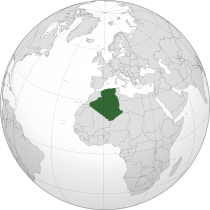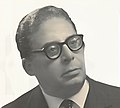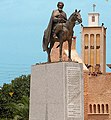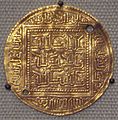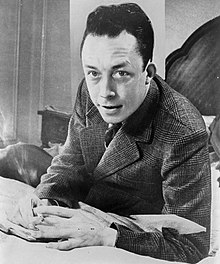 The Algeria Portal
Algeria, officially the People's Democratic Republic of Algeria, is a country in the Maghreb region of North Africa. It is bordered to the northeast by Tunisia; to the east by Libya; to the southeast by Niger; to the southwest by Mali, Mauritania, and Western Sahara; to the west by Morocco; and to the north by the Mediterranean Sea. Algeria has a semi-arid climate, with the Sahara desert dominating most of the territory except for its fertile and mountainous north, where most of the population is concentrated. Spanning 2,381,741 square kilometres (919,595 sq mi), it is the world's tenth largest nation by area, and the largest nation in Africa. With a population of 44 million, Algeria is the tenth-most populous country in Africa, and the 32nd-most populous country in the world. The capital and largest city is Algiers, located in the far north on the Mediterranean coast. Algeria's official languages are Arabic and Tamazight; French is used in media, education, and certain administrative matters. The vast majority of the population speak the Algerian dialect of Arabic. Most Algerians are Arabs, with Berbers forming a sizeable minority. Sunni Islam is the official religion and practised by 99 percent of the population. (Full article...) Selected article -
Constantine (Arabic: قسنطينة, romanized: Qusanṭīnah), also spelled Qacentina or Kasantina, is the capital of Constantine Province in northeastern Algeria. During Roman times it was called Cirta and was renamed "Constantina" in honour of Emperor Constantine the Great. Located somewhat inland, Constantine is about 80 kilometres (50 miles) from the Mediterranean coast, on the banks of the Rhumel River. Constantine is regarded as the capital of eastern Algeria and the commercial centre of its region and has a population of about 450,000 (938,475 with the agglomeration), making it the third largest city in the country after Algiers and Oran. There are several museums and historical sites located around the city. Constantine is often referred to as the "City of Bridges" because of the numerous picturesque bridges connecting the various hills, valleys, and ravines that the city is built on and around. (Full article...)General images -The following are images from various Algeria-related articles on Wikipedia.
Did you know
Selected biography -Albert Camus (/kæmˈuː/ kam-OO; French: [albɛʁ kamy] ; 7 November 1913 – 4 January 1960) was a French philosopher, author, dramatist, journalist, world federalist, and political activist. He was the recipient of the 1957 Nobel Prize in Literature at the age of 44, the second-youngest recipient in history. His works include The Stranger, The Plague, The Myth of Sisyphus, The Fall and The Rebel. Camus was born in Algeria during the French colonization, to pied-noir parents. He spent his childhood in a poor neighbourhood and later studied philosophy at the University of Algiers. He was in Paris when the Germans invaded France during World War II in 1940. Camus tried to flee but finally joined the French Resistance where he served as editor-in-chief at Combat, an outlawed newspaper. After the war, he was a celebrity figure and gave many lectures around the world. He married twice but had many extramarital affairs. Camus was politically active; he was part of the left that opposed Joseph Stalin and the Soviet Union because of their totalitarianism. Camus was a moralist and leaned towards anarcho-syndicalism. He was part of many organisations seeking European integration. During the Algerian War (1954–1962), he kept a neutral stance, advocating a multicultural and pluralistic Algeria, a position that was rejected by most parties. (Full article...)
Selected cuisines, dishes and foods - Related portalsWikiProjects
{{{contents}}}
CategoriesSelect [►] to view subcategories
Things you can do
New articlesThis list was generated from these rules. Questions and feedback are always welcome! The search is being run daily with the most recent ~14 days of results. Note: Some articles may not be relevant to this project. Rules | Match log | Results page (for watching) | Last updated: 2024-06-02 19:39 (UTC) Note: The list display can now be customized by each user. See List display personalization for details.
Algeria topics
Associated WikimediaFind this theme on other projects coordinated by the Wikimedia Foundation, Wikipedia hosting provider:
| |||||||||||||||||||||||||||||||


